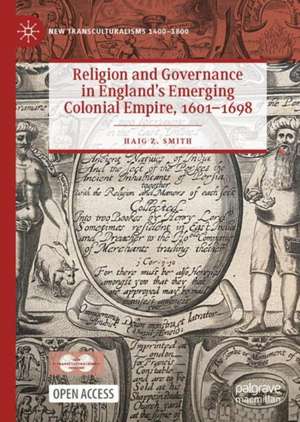Religion and Governance in England’s Emerging Colonial Empire, 1601–1698: New Transculturalisms, 1400–1800
Autor Haig Z. Smithen Limba Engleză Paperback – 8 ian 2022
| Toate formatele și edițiile | Preț | Express |
|---|---|---|
| Paperback (1) | 281.36 lei 3-5 săpt. | +22.99 lei 6-12 zile |
| Springer International Publishing – 8 ian 2022 | 281.36 lei 3-5 săpt. | +22.99 lei 6-12 zile |
| Hardback (1) | 360.24 lei 3-5 săpt. | +27.97 lei 6-12 zile |
| Springer International Publishing – 8 ian 2022 | 360.24 lei 3-5 săpt. | +27.97 lei 6-12 zile |
Preț: 281.36 lei
Nou
Puncte Express: 422
Preț estimativ în valută:
53.84€ • 57.57$ • 44.89£
53.84€ • 57.57$ • 44.89£
Carte disponibilă
Livrare economică 27 martie-10 aprilie
Livrare express 12-18 martie pentru 32.98 lei
Preluare comenzi: 021 569.72.76
Specificații
ISBN-13: 9783030701338
ISBN-10: 3030701336
Pagini: 261
Ilustrații: XI, 292 p. 1 illus.
Dimensiuni: 148 x 210 x 23 mm
Greutate: 0.4 kg
Ediția:1st ed. 2022
Editura: Springer International Publishing
Colecția Palgrave Macmillan
Seria New Transculturalisms, 1400–1800
Locul publicării:Cham, Switzerland
ISBN-10: 3030701336
Pagini: 261
Ilustrații: XI, 292 p. 1 illus.
Dimensiuni: 148 x 210 x 23 mm
Greutate: 0.4 kg
Ediția:1st ed. 2022
Editura: Springer International Publishing
Colecția Palgrave Macmillan
Seria New Transculturalisms, 1400–1800
Locul publicării:Cham, Switzerland
Cuprins
1. Introduction: Introduction: ‘A Just Government’: Empire, Religion, Chaplains and the Corporation .- 2. The Virginia Company and the Foundations of Religious Governance in English Commercial Expansion .- 3. The Plymouth Company and Massachusetts Bay Company (1622–1639): Establishing Theocratic Corporate Governance .- 4. Apostasy and Debauchery (1601–1660): Behaviour, Passive Evangelism and the East India and Levant Company Chaplains .- 5. The Massachusetts Bay Company and New England Company (1640–1684): Exportation, Revaluation and the Demise of Corporate Theocratic Governance .- 6. The East India Company (1661–1698): Territorial Acquisition and the ‘Amsterdam of Liberty’ .- 7. Conclusion .- 8. Bibliography.
Notă biografică
Haig Z. Smith is a Research Associate on the ERC-funded TIDE project (Travel, Transculturality and Identity in Early Modern England, 1550-1700) at the University of Oxford, UK. He has previously published on a number of topics relating to religion and English overseas expansion in the early modern period.
Textul de pe ultima copertă
This open access book explores the role of religion in England's overseas companies and the formation of English governmental identity abroad in the seventeenth century. Drawing on research into the Virginia, East India, Massachusetts Bay, Plymouth, New England and Levant Companies, it offers a comparative global assessment of the inextricable links between the formation of English overseas government and various models of religious governance across England's emerging colonial empire. While these approaches to governance varied from company to company, each sought to regulate the behaviour of their personnel, as well as the numerous communities and faiths which fell within their jurisdiction. This book provides a crucial reassessment of the seventeenth-century foundations of British imperial governance.
Caracteristici
This book is open access, which means that you have free and unlimited access Highlights the importance of religion in England's overseas companies the formation of English governmental identity in the seventeenth century Draws on examples from across England's emerging colonial empire Sheds light on the seventeenth-century foundations of imperial governance








